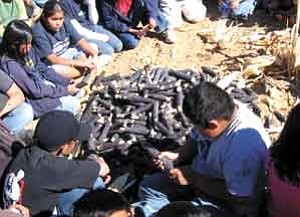Adapting to environment through cultural teaching
TC District's Eagles Nest Intermediate students learn from the ground up
KYKOTSMOVI -- What better way to teach effectively while embracing traditional culture in celebration of Tuba City Unified School District Dual Language Week, than to take students directly to a traditional Hopi cornfield?
This past week, five Eagles Nest Intermediate School classes actually harvested corn, including stacking it and seeing how it's made into "piki." They heard from Hopi farmers about the unique method of dry farming and then headed home with an ear of genuine Hopi blue corn to plant next spring in their own yards.
TC District's teachers Amanda Saganitso, Denise Masayesva-Nutumya, Esther Masayesva-Skrelunas, Jennifer Henderson, Lisa DeJolie and Lolita Rosanda Tohannie, organized the field trip to Kykotsmovi at Third Mesa to have their students experience a "hands on" social studies lesson.
Five teachers, 120 students and four Elder Hostel visitors spent an entire day, engaging in the ancient American Indian tradition of harvesting corn.
Two Tuba City District School buses headed to the Masayesva farm located near Kykotsmovi. The day was perfect for harvesting corn--calm, very sunny.
From their squeals, it was obvious students enjoyed opening each ear much like a husk wrapped organic present to see what color of corn ear they would get.
"Mine is blue ! Mine is red !" could be heard excitedly as students got to see up close the variations of color in Hopi corn-- colors that range from deep red maroon to bright orange, orange with white sunbursts to bright yellow, pale yellow, gray blue, hazy blue, dark cobalt blue and finally white.
This was a new experience for many of the ENIS students who in Tuba City do not have access to farming areas or have lived in more metropolitan areas of the Navajo reservation.
"This is the best thing we have learned all year !" exclaimed one student.
Students listened intently to Hopi farmers, Betram Tsavadawa and Ruben Saufkie explain the dry farming method and how difficult Hopi farming can be because crops are dependent upon individual farmer's prayers for rain and natural moisture from the sky.
Tsavadawa and Saufkie shared how such an arid environment could still produce corn when corn seeds are planted in moist earth.
The Hopi method of raising corn is also based on family support, sharing the tasks of farming between old and young family member's teamwork.
Tsavadawa and Saukfie explained that since all plants are living things, that they respond to song and prayers and these two activities must also be a part of successful Hopi farming.
In addition to working in the Masayesva cornfield that day, the five teachers took the students to the Hotevilla traditional spring area and to the terraced gardens that the village women tend to.
These terraced gardens are the only crops that are irrigated with water from the natural spring area and pass from mother to daughter, belonging only to female members of the village and tribe.
Students were able to see how natural springs come from the ground and came to realize how very precious water is to all life, especially in raising crops.
They also heard that care must be taken to preserve these natural spring areas located in many places on both the Navajo and Hopi tribal land--reserves for not just themselves but for future generations--and they must take responsibility to ensure water longevity for their future families.
Students said that this is one fieldtrip they will never forget.
For more information about Tuba City District's educational and cultural curriculum, contact Tuba City District's Office of Public Relations for appointment touring any of the Tuba City District's seven schools by calling 928-283-1072.
(Rosanda Suetopka Thayer is Public Relations Director for Tuba City Unified School District.)
SUBMIT FEEDBACK
Click Below to:




